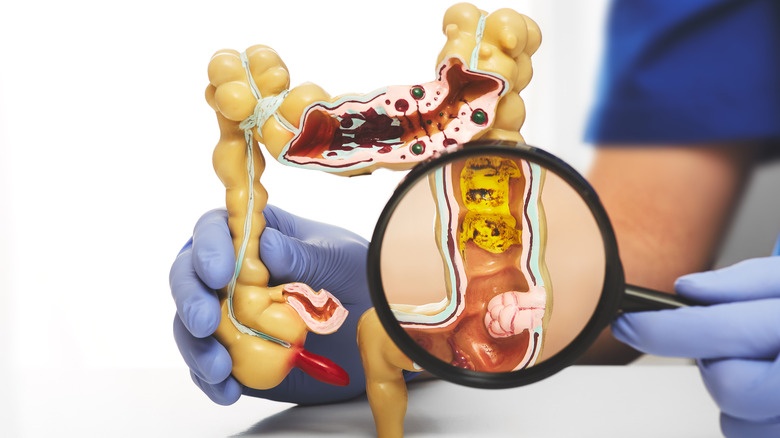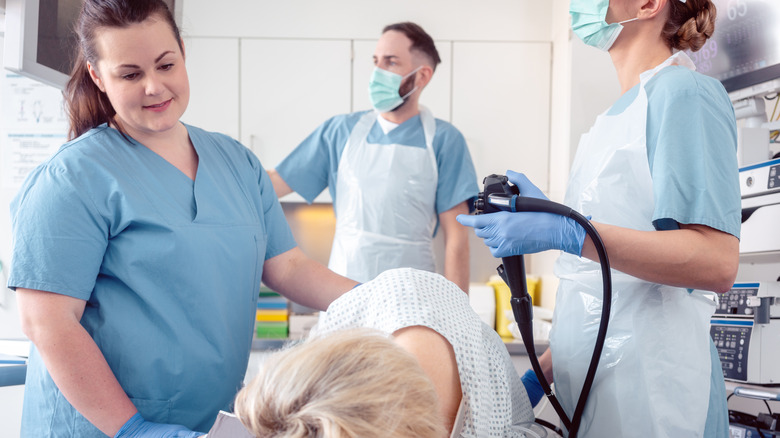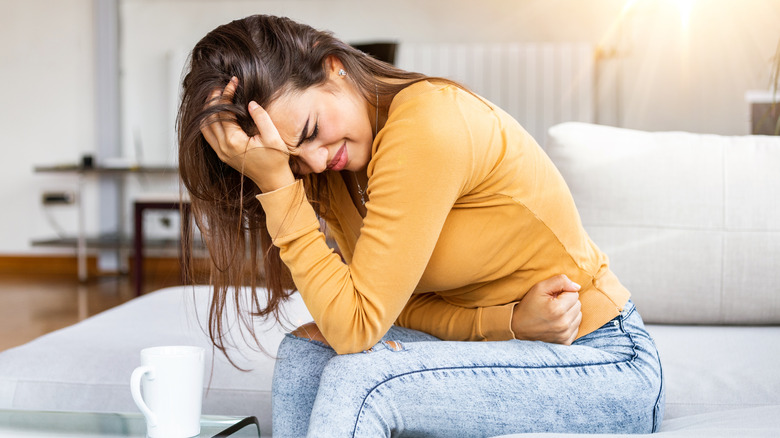When Should You Get Your First Colonoscopy?
Your first colonoscopy can be nerve-racking. First is the preparation phase. Chances are, you'll have to go on a liquid diet for a day or longer, drinking a solution meant to help clear your bowels, according to the American College of Gastroenterology (ACG). Enemas are required in some cases, too. Then comes the procedure itself, which is not painful, but may cause some discomfort. Your doctor will most likely use conscious sedation, or twilight sedation, to help you relax. You will still be awake and able to breathe on your own, though you may feel drowsy. Meanwhile, a gastroenterologist will examine your colon, or large intestine, and rectum by inserting a thin tube into your anus (via Cleveland Clinic). He will also blow air through the tube to expand your colon and check for polyps, tumors, and other signs of disease. The examination takes about 30 minutes.
As unpleasant as it may be, this screening test could save your life. The American Cancer Society estimates that colorectal cancer will cause nearly 53,000 deaths in 2021 alone. Moreover, about one in 23 men and one in 25 women will develop this disease at some point in their lives, and colorectal cancer rates are also increasing among young people. So when should you get your first colonoscopy?
Get your first colonoscopy earlier rather than later
Colonoscopies allow medical professionals to detect colon and rectal cancers at a more treatable stage. "If we catch colorectal cancer early, more than 95 percent of patients are still alive five years later. If we catch it after it has grown and spread, treatment doesn't always work well," Dr. Djenaba Joseph told Healthline. For this reason, the ACG recommends getting your first colonoscopy at age 45 if you have no risk factors for colorectal cancer.
Individuals with a family history of precancerous polyps or colon cancer should get screened around age 40, or at 10 years before the age that their parents, siblings, or other first-degree relatives developed colorectal cancer. If your test results are normal, you won't need another colonoscopy for 10 years (assuming that you're in good health), says Healthline. People with inflammatory bowel diseases may need a colonoscopy yearly or every two years (per the Crohn's and Colitis Foundation).
These guidelines only apply to individuals under 75 years old. Seniors aged 76 to 86 years who have previously received adequate screening no longer need to get regular colonoscopies, according to the U.S. Preventive Services Task Force. As the researchers note, routine screening after age 75 has small net benefit. However, a new study published in JAMA Oncology suggests the opposite. Scientists found that individuals over age 75 who underwent regular colonoscopies or sigmoidoscopies had a significantly lower risk of developing colorectal cancer than those who didn't undergo routine screenings.
Some people may need to get screened earlier and more often than others
Depending on your overall health, you may need to get your first colonoscopy before age 45. People with a personal history of colorectal cancer should undergo this procedure at an earlier age and more often than the general population, notes Medscape. The same goes for those with chronic inflammatory bowel disorders or who have a family history of colorectal cancer. Other risk factors include having a history of adenomas, inherited gene mutations, or Lynch syndrome, according to the American Cancer Society. Colorectal cancer also tends to affect those with type II diabetes. Both disorders share some of the same risk factors, warns the American Cancer Society.
You should also watch out for particular symptoms that might indicate a problem. "So if you were to present with rectal bleeding, severe constipation, other symptoms, diarrhea that's not explained, then you need to find out why that's happening. And colonoscopy is the quickest, most accurate, and best way of finding that out," says colorectal surgeon James Church (via the Cleveland Clinic).
Having one or more risk factors for colon cancer doesn't mean you'll get sick, but prevention is better than the alternative. In addition to eating healthily and maintaining other good habits, regular screenings can make all the difference.



